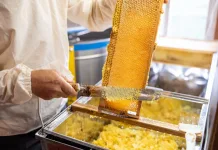
Among the huge array of objects which make up Leeds City Museum’s In Their Footsteps exhibition, there are many stirring examples of courage and heroism.
But in some ways, the story of Jogendra Sen epitomises the selflessness and dedication shown by the Leeds soldiers who gave their lives on the battlefields of the First World War.

Born in 1887 in Chandernagore, India, Jogendra travelled to Yorkshire in 1910 where he studied electrical engineering at the University of Leeds before working as an assistant engineer in the Leeds Corporation electric light works on Whitehall Road.
When the Leeds Pals battalion was raised in 1914, he was among the first to sign up but, despite his education, he was denied the rank of officer because of his race.
Throughout his service, Private Sen remained the only non-white soldier to serve in the 15th West Yorkshire Regiment.
He was killed near the Somme in 1916, in an encounter with the enemy at the age of 28.
Private Sen’s portrait, which currently hangs in the museum’s special exhibition space, was commissioned by Co-Create Arts and Cambridge International Arts for their ‘Forgotten Heroes’ portraiture project and was painted by Caroline Jaine
The soldier’s name is also on the University of Leeds’s war memorial as well as the rolls of honour in Mill Hill Unitarian Chapel, where he was a member of the choir.
Councillor Brian Selby, Leeds City Council’s lead member for museums and galleries, said: “Private Sen gave his life in service of his country, a sacrifice made all the more poignant by the fact he had faced such discrimination when signing up.
“Like so many Leeds soldiers, he put his desire to serve ahead of himself and it is fitting that he is now commemorated in this wonderful exhibition alongside his comrades, a tragic number of whom also made the ultimate sacrifice.”














